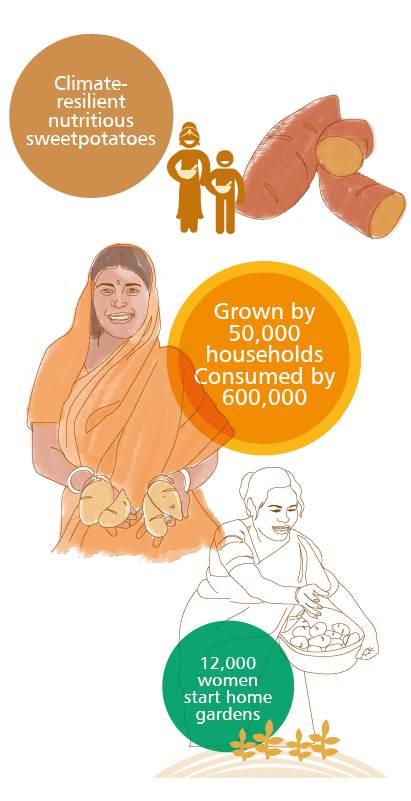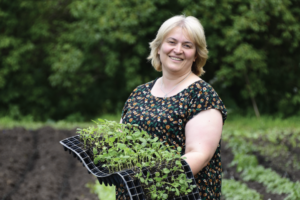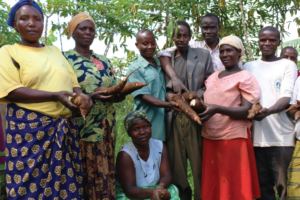With help from the International Potato Center (CIP) and local partners, almost 50,000 land-poor households began growing climate-smart and nutritious sweetpotato varieties between 2019 and 2021, producing food for more than 200,000 family members and an estimated 400,000 consumers, with sales of more than USD 2.5 million. Two-thirds of the calories Bangladeshis consume come from rice, but sweetpotato produces more calories per hectare and orange-fleshed sweetpotato, in particular, is an excellent source vitamin A, which is essential for the health and development of pregnant women and children.
Since 2007, Bangladesh’s southern delta districts have been hit by more than a dozen tropical cyclones that flooded coastal areas, resulting in salty soils that have reduced productivity in approximately 40% of the arable land. A strategic partnership between CIP, the Bangladesh Agricultural Research Institute (BARI), and the University of Hohenheim resulted in the selection of high-yielding, heat- and salt-tolerant sweetpotato and potato varieties, which are being grown by farmers or are in the pipeline for future release.
To disseminate new sweetpotato varieties, 283 farmers – more than half women – were trained in growing vines to produce quality cuttings for farmers to plant. Over the past three years, they’ve sold 29 million vine cuttings – enough to cover 500 hectares – to tens of thousands of women and men. While salt- and heat-tolerant varieties enable farmers in southern Bangladesh to cope with the effects of climate change, pro-vitamin-A biofortified sweetpotatoes are helping families in Rangpur Division, in northwestern Bangladesh, to reduce child stunting – a persistent problem in the area despite a significant reduction nationally.
Diversifying diets
CIP and partners provide agronomic training for farmers and support efforts to market their crops. Between Rangpur division and Cox’s Bazar, in the south, 40,000 farmers produced nearly 4,300 metric tons of orange-fleshed sweetpotato in 2021, more than half of which was sold. In Cox’s Bazar, where 700,000 Rohingya refugees have settled, at least 42,000 refugees purchased the crop.
“One kilo of sweetpotato costs half as much as a kilo of rice in Bangladesh, which makes it a vital crop for the food and nutrition security of vulnerable populations,” notes CIP scientist Debashish Chanda.
Though sweetpotato consumption remains low in Bangladesh, CIP is helping build the foundation for widespread production, while validating approaches to take it to scale. This includes partnering with two Bangladeshi NGOs on a holistic, gender-responsive approach to promote sweetpotato cultivation and diet diversification. Ninety-three women were trained to be community nutrition scholars, who teach young mothers and caregivers good hygiene and improved methods for feeding small children with a “healthy baby toolkit,” among other things. These trainers worked with approximately 12,000 women and distributed orange-fleshed sweetpotato vines and seed for spinach, squash, and other vegetable crops to help them establish home gardens.
“I didn’t understand the importance of nutritious vegetables like orange-fleshed sweetpotato until I became a nutrition scholar, but now I grow them in my garden and help other women to do the same,” says 24-year-old Shoma Khatun. After her father passed away three years ago, Khatun became the family breadwinner and she used income from selling vegetables to purchase hens whose eggs they now eat and sell.
Sustainable intensification
While sweetpotato is primarily planted in gardens and smaller plots, salt-tolerant potatoes are being grown in paddies during the fallow months between rice crop cycles, a sustainable intensification practice used in various Asian countries. BARI and two private companies sold 20,000 kg of seed potatoes of the climate-smart varieties in 2021, and plan to significantly increase production in 2022 to meet farmer demand.
To facilitate their incorporation in rice-based farming systems, CIP and partners are training farmers in a zero-tillage potato planting approach that reduces the cost of cultivation, improves soil health and has great potential to boost food production and incomes in southern Bangladesh.
As the risk of extreme climate events increases and malnutrition persists, robust and resilient potatoes and sweetpotato will play a key role in nourishing Bangladesh.
Funders: CGIAR Trust Fund donors; Foreign Commonwealth and Development Office, UK; Bundesministerium für wirtschaftliche Zusammenarbeit und Entwicklung/Deutsche Gesellschaft für Internationale Zusammenarbeit.
Key partners: Bangladesh Agricultural Research Institute; Food and Agriculture Organization of the United Nations; Gana Unnayan Kendra, Bangladesh; Prodipan, Bangladesh; University of Hohenheim, Germany.
Associated CGIAR Research Programs: Roots Tubers and Bananas; Agriculture for Nutrition and Health.





